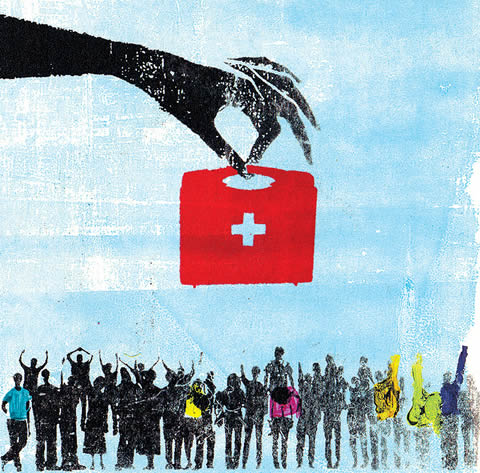Among the 94 recommendations made by Canada’s Truth and Reconciliation Commission in June, one urged governments to “recognize and implement the health-care rights of Aboriginal people, as identified in international law.”
The commission’s reference to a right to health care in international law intrigued Prof. Lisa Forman, a professor at the Dalla Lana School of Public Health.
That’s because although several major international conventions say there’s a human right to health care, such statements, until recently, were widely considered empty promises – so much lip service to high aspiration.
This is beginning to change, though. Around the world, increasingly, plaintiffs are suing governments to force them to provide particular health services, citing this alleged right – and, often enough, they’re winning.
The shift has been decades in the making. One of the United Nations’ founding conventions, the 1948 Universal Declaration of Human Rights, states there’s a right to medical care, as does the 1966 International Covenant on Economic, Social and Cultural Rights – the latter pushes member nations to help citizens reach the “highest attainable standard of physical and mental health.”
“That sounds like an impossible ideal,” says Forman, whose research focuses on health care under international law. But it’s becoming possible. She outlines how these vague, aspirational provisions have lately given rise to enforceable rights. The 1948 declaration is mainly used by international lawyers as a source of general principles – relevant but not, on their own, determinative of a country’s legal obligations. On the other hand, the 1966 covenant is, in theory, binding on its 164 members, Canada among them, because it has treaty status.
The U.S., though, has not ratified it, which helps explain why the covenant hasn’t received wider recognition. “In the Cold War,” Forman explains, “the West focused more on civil liberties as the core rights, the Eastern bloc on the so-called socio-economic rights.” Civil liberties include free speech and freedom from unjust imprisonment; among the socioeconomic rights are shelter, sustenance and health care.
Some of the post-Cold War action on health care has come in Forman’s native South Africa, in part because the country’s post-apartheid constitution promotes socio-economic rights. “Ratification of these conventions can be practically meaningless,” Forman says. “The treaty provisions have to be given force domestically.”
This happened in 2002, when a South African court required the government to provide a drug to expectant mothers that limited the transmission of HIV to their fetuses. “The international conventions, the domestic constitution and domestic health legislation all informed the court’s reasoning.” Courts in jurisdictions as diverse as Colombia, Brazil and India have also given legal teeth to the right to medical care.
Forman believes that the idea of a right to health has persuasive value to societies and their governments. In a 2011 case covered by The New York Times, a Ugandan court ruled that a maternal mortality suit was a “political question” outside its jurisdiction. However, in a 2015 case in Uganda, she notes, a court “found a maternal death to violate human rights and awarded damages to the family.”
Canada’s Charter of Rights and Freedoms, unlike South Africa’s constitution, does not explicitly protect socioeconomic rights, but periodically plaintiffs have claimed, with mixed success, that the charter’s security-of-the-person and equality protections apply in the health-care context. The Canadian story, it seems, is still unfolding.
The Right to Health at the Public-Private Divide (2014) includes an essay by Lisa Forman.






